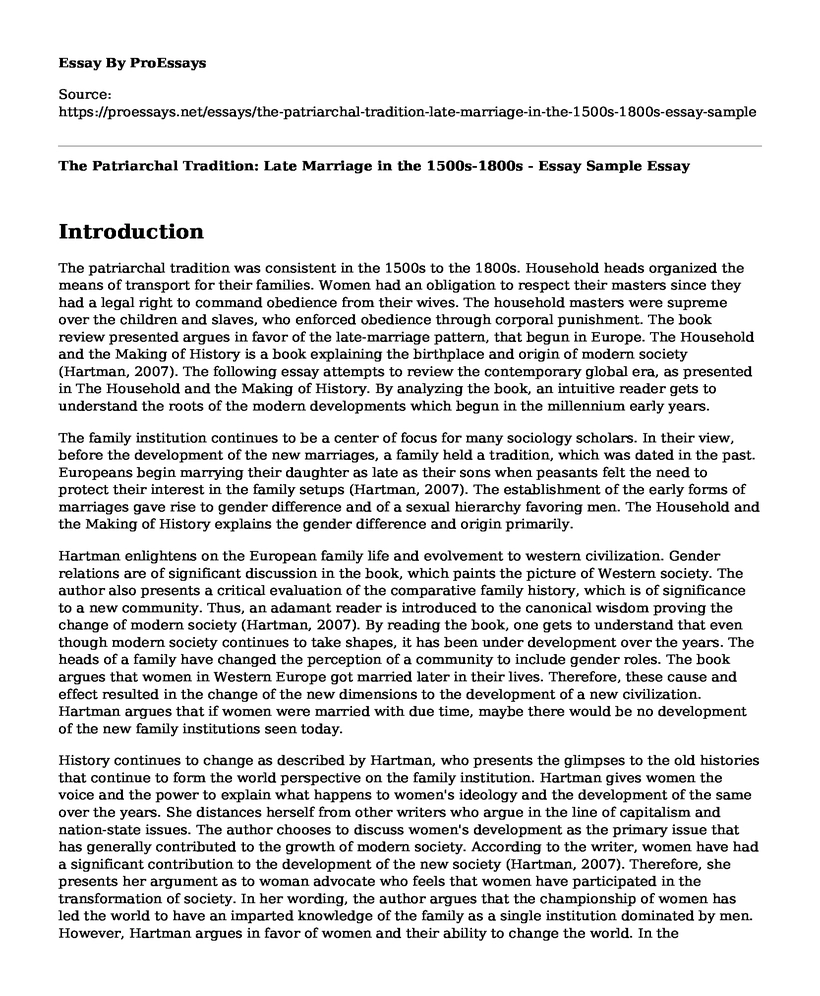Introduction
The patriarchal tradition was consistent in the 1500s to the 1800s. Household heads organized the means of transport for their families. Women had an obligation to respect their masters since they had a legal right to command obedience from their wives. The household masters were supreme over the children and slaves, who enforced obedience through corporal punishment. The book review presented argues in favor of the late-marriage pattern, that begun in Europe. The Household and the Making of History is a book explaining the birthplace and origin of modern society (Hartman, 2007). The following essay attempts to review the contemporary global era, as presented in The Household and the Making of History. By analyzing the book, an intuitive reader gets to understand the roots of the modern developments which begun in the millennium early years.
The family institution continues to be a center of focus for many sociology scholars. In their view, before the development of the new marriages, a family held a tradition, which was dated in the past. Europeans begin marrying their daughter as late as their sons when peasants felt the need to protect their interest in the family setups (Hartman, 2007). The establishment of the early forms of marriages gave rise to gender difference and of a sexual hierarchy favoring men. The Household and the Making of History explains the gender difference and origin primarily.
Hartman enlightens on the European family life and evolvement to western civilization. Gender relations are of significant discussion in the book, which paints the picture of Western society. The author also presents a critical evaluation of the comparative family history, which is of significance to a new community. Thus, an adamant reader is introduced to the canonical wisdom proving the change of modern society (Hartman, 2007). By reading the book, one gets to understand that even though modern society continues to take shapes, it has been under development over the years. The heads of a family have changed the perception of a community to include gender roles. The book argues that women in Western Europe got married later in their lives. Therefore, these cause and effect resulted in the change of the new dimensions to the development of a new civilization. Hartman argues that if women were married with due time, maybe there would be no development of the new family institutions seen today.
History continues to change as described by Hartman, who presents the glimpses to the old histories that continue to form the world perspective on the family institution. Hartman gives women the voice and the power to explain what happens to women's ideology and the development of the same over the years. She distances herself from other writers who argue in the line of capitalism and nation-state issues. The author chooses to discuss women's development as the primary issue that has generally contributed to the growth of modern society. According to the writer, women have had a significant contribution to the development of the new society (Hartman, 2007). Therefore, she presents her argument as to woman advocate who feels that women have participated in the transformation of society. In her wording, the author argues that the championship of women has led the world to have an imparted knowledge of the family as a single institution dominated by men. However, Hartman argues in favor of women and their ability to change the world. In the documentation, the author emphasizes that without women, there would be slow development of contemporary societies, which have progressed effectively in recent years.
Hartman presents credible arguments generated from the past decades on history and women. Family historians create the platform to argue and view the growth of modern women and the development of modern society. The nuclear family is the epicenter of the development of the Northwestern European societies, given that it constitutes the demographic characteristic. According to the author, the families of Western Europe created marriages and household systems, which described the new West (Hartman, 2007). Importantly, the author's wording and choice of context explain the development of European society, something that Hartman feels started in Ancient times.
Conclusion
In conclusion, The Household and the Making of History explains the world's development of the family institution. Hartman uses the book to describe the history of the world, with a particular emphasis on the rise of the West. According to the author, the world developed faster immediately after women started forming families. The European societies in the 15th century realized that by marrying off young women, they would form a kind of civilization currently appreciated by modern societies. The author gives an introduction to the difference between the early and late marriage systems that changed the perspective of family institutions. Hartman expresses the view that northwestern Europe has a kind of distinctiveness, uniquely tied to the development of the late-marriage institution. Even though may not easily understand the book, it becomes evident that the book has more history to offer on the development of a family institution.
References
Hartman, M. (2007). The Household and the Making of History: A Subversive View of the Western Past. Brantford, Ont.: W. Ross MacDonald School Resource Services Library.
Cite this page
The Patriarchal Tradition: Late Marriage in the 1500s-1800s - Essay Sample. (2023, Feb 27). Retrieved from https://proessays.net/essays/the-patriarchal-tradition-late-marriage-in-the-1500s-1800s-essay-sample
If you are the original author of this essay and no longer wish to have it published on the ProEssays website, please click below to request its removal:
- Child Crisis Arizona: Speech
- American History From 1877 to Current Essay
- Inter-Agency Collaboration and Cooperation in Seattle Police Paper Example
- Essay Sample on Gender and Colonialism: Corrie Decker - History
- New Fathers: Transitions, Changes, and Expectations - Essay Sample
- Paper Example on Japanese Imperium: Selfishness Over Diplomacy in East Asia
- Paper Example on American Factory: Hope and Frustration in Uneasy Union







